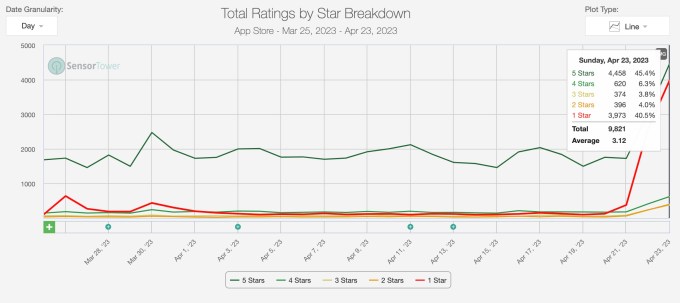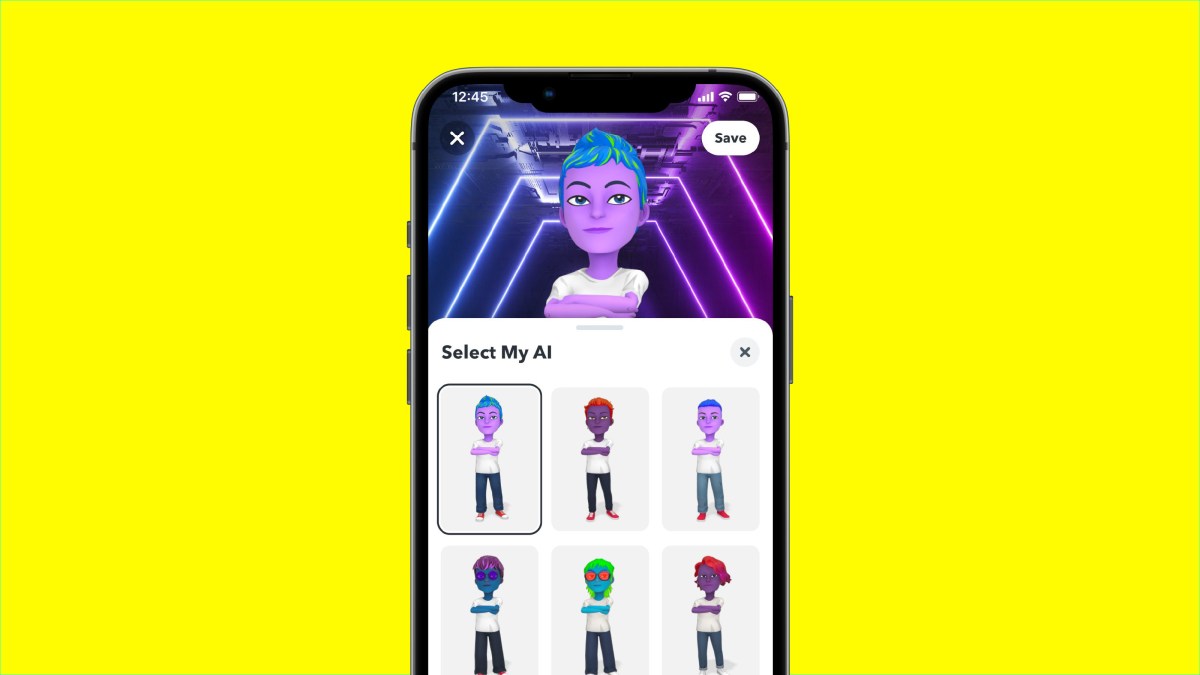
The user reviews for Snapchat’s “My AI” feature are in — and they’re not good. Launched last week to global users after initially being a subscriber-only addition, Snapchat’s new AI chatbot powered by OpenAI’s GPT technology is now pinned to the top of the app’s Chat tab where users can ask it questions and get instant responses. But following the chatbot’s rollout to Snapchat’s wider community, Snapchat’s app has seen a spike in negative reviews amid a growing number of complaints shared on social media.
Over the past week, Snapchat’s average U.S. App Store review was 1.67, with 75% of reviews being 1-star, according to data from app intelligence firm Sensor Tower. For comparison, across Q1 2023, the Snapchat average U.S. App Store review was 3.05 with only 35% of reviews being 1-star.
The number of daily reviews has also increased by 5 times over the last week, the firm noted.
Another app data provider, Apptopia, reports a similar trend. Its analysis shows “AI” was the top keyword in Snapchat’s App Store reviews over the past seven days, where it was mentioned 2,973 times. The firm has given the term an “Impact Score” rating of -9.2. This Impact Score is a weighted index that measures the effect a term has on sentiment and ranges from -10 to +10.
Apptopia also said that Snapchat received around 3x more 1-star ratings than usual on April 20, 2023. That’s the day after the My AI global release was announced.
Now, the number of 1-star reviews is starting to come down a bit, but they still remain elevated.
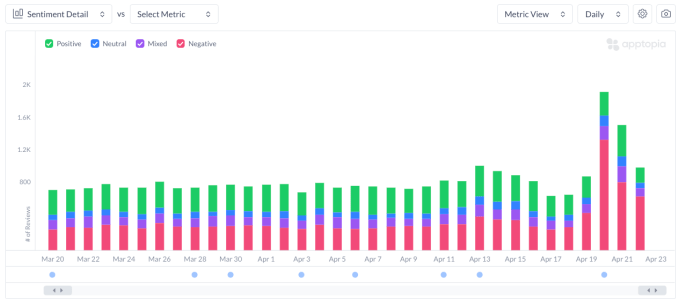
Image Credits: Apptopia (analysis of Snapchat app ratings)
The backlash against Snapchat’s My AI comes at a time when the hype around AI is at an inflection point. Companies are weighing how to integrate AI into their businesses, not if they should.
For Snap, the addition of an AI chatbot to its social app would have been thought to be a smart move, as dozens of AI chatbot apps are filling the app stores, raking in millions of dollars — a signal that could easily be interpreted to indicate growing consumer demand for social AI chat experiences.
But many Snapchat users aren’t thrilled with My AI, which appeared inside their app without warning or their consent.
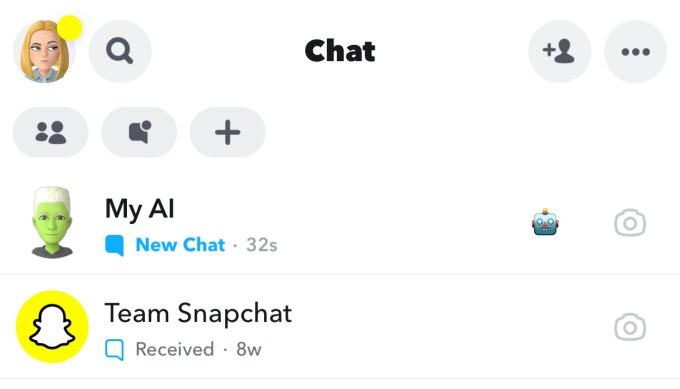
Image Credits: Snapchat screenshot
To some extent, it’s the chatbot’s placement that’s the cause of concern.
My AI is pinned to the top of users’ Chat feed inside the app and can’t be unpinned, blocked, or removed, as other conversations can be. This feed is where Snapchat users have regular interactions with friends and isn’t necessarily a place they want to toy around with experimental features. Plus, Snapchat already has an established presence in this feed with its own “Team Snapchat” chats, and now it’s doubling the screen real estate it wants to take for itself — or, at least, that’s how some users see it.
It’s not difficult to find complaints about the My AI feature on social media. A simple search for “My AI” on Twitter, for instance, will reveal numerous results. Users are also sharing their complaints with Snapchat directly.
After announcing the new chatbot in a tweet last week during Snap’s Partner Summit event, users took the replies to cite their grievances.
In dozens of responses to Snap’s tweet, users are fully panning the AI bot. They’re saying it should be opt-in only or that they should be given the option to remove it, instead of having it forced upon them. Some users are so upset they’re even threatening to quit Snapchat over this and delete the app entirely.
Many are also pushing back at the fact that removing the My AI from their Chat feed requires a Snapchat+ subscription. According to Snap’s own documentation, Snapchat+ subscribers will receive early access to new My AI features and have the ability to unpin My AI or remove it from their Chats.
This angers people who now feel like they’re being forced to pay Snapchat after it messed up their app with an unwanted feature.
Not only do users find the AI feature invasive, some find it creepy, as well.
They’re surprised to learn that Snapchat’s AI knows their location, for example, and can use that information in its responses, even if they’re not sharing their location on the Snap Map.
In a way, the AI bot is surfacing the level of personal data collection that social media companies do in the background, and putting it directly in front of the consumer. As it turns out, that’s not a great selling point when the users don’t feel they’ve specifically opted in to share that data with the AI.
This speaks to a larger debate now taking place around AI, as people are waking up to the fact that it’s our own data and our labor in creating information for the web that has allowed these AI systems to come into existence in the first place. Modern AIs are trained on large data sources, including those they licensed but also on publicly available data on the internet and our personal information.
In addition, Snapchat’s My AI had already been the subject of serious concerns before its public rollout.
While available as a subscriber-only feature, The Washington Post reported the bot was responding in an unsafe manner. After telling the bot the user was a 15-year-old, the AI made suggestions about how to mask the smell of alcohol and pot at a birthday party. It also wrote an essay for school for the teen. When the bot was told the user was 13, it responded to a question about how to set the mood when having sex for the first time, the paper reported.
Snap downplayed the claims at the time, saying some people had tried to “trick the chatbot into providing responses that do not conform to our guidelines.” However, it then rolled out new tools including age filters to keep the AI responses more age-appropriate, and promised parental controls were on the way.
Those parental controls were still not available at the time of My AI’s public launch and Snap gave no update as to when they could be expected.
Despite the numerous complaints, there were a handful of dissenters to the backlash over My AI.
“Am I the only one who loves it?,” asked one user in the replies to Snapchat’s tweet. Only one person responded to them, saying just “yo.”
Digging into the negative review spike, it becomes clear that Snapchat’s app ratings don’t even tell the full story here.
A chart from Sensor Tower, for instance, shows that 5-star reviews also spiked over the past few days alongside the 1-star reviews where users were complaining about the My AI feature. That would lead one to believe that the AI feature is divisive, as opposed to being widely panned.
But a closer inspection of those 5-star reviews indicates that many of them also include My AI complaints. For example, one threatens “Get rid of AI. Or I will change my review to a 1 star. Nobody at all wants AI on Snapchat.”
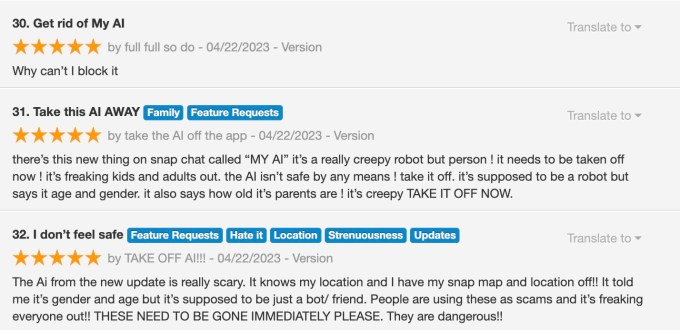
Image Credits: Sensor Tower (analysis of Snapchat app reviews)
Several other 5-star reviews demand to block the AI or remove it, call it creepy or “crap” and yet the user has still rated the app 5 stars. It’s unclear if that’s due to user error, issues with Sensor Tower analysis, or something else. In any event, a number of these “5-star” reviews should be considered negative reviews or complaints, based on their actual commentary.
Still, scrolling through the App Store reviews sorted by “Most Recent” shows how many complaints there are. Nearly all the new reviews have something to say about My AI, and the majority are not good.
Snapchat declined to comment on the situation but noted that Snapchat+ users sent nearly 2 million chats to the AI while in early testing.
The company says it’s constantly iterating on Snapchat’s features based on the community’s feedback but did not commit to removing the AI.
Instead, a Snapchat spokesperson said if users didn’t like the AI feature, they don’t have to use it.

